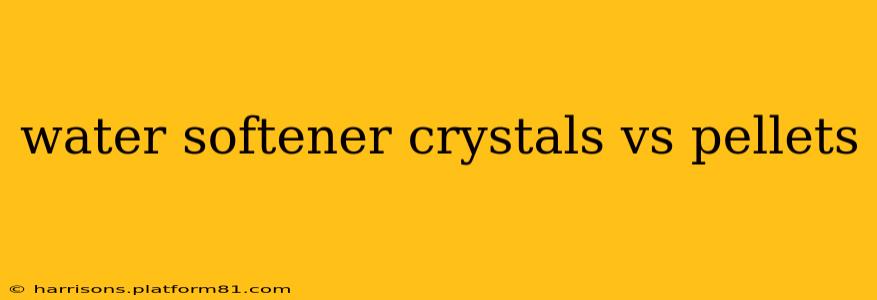Choosing between water softener crystals and pellets can feel overwhelming. Both effectively soften water, but they differ in several key aspects that impact performance, cost, and environmental impact. This comprehensive guide breaks down the differences, helping you make an informed decision for your home.
What are Water Softener Crystals?
Water softener crystals, often made of sodium chloride (common table salt), are a relatively newer entry in the water softening market. They are typically denser than pellets, meaning you might need to use less to achieve the same softening effect. This density can also lead to faster dissolving rates, potentially requiring less frequent refills. However, the finer grain size can sometimes lead to increased dust and potential clogging issues if not handled carefully.
What are Water Softener Pellets?
Water softener pellets, also primarily sodium chloride, are the more traditional choice. They are larger and denser than crystals, offering a more consistent and slower dissolving rate. This slower dissolution can translate to fewer refills, but it might also mean a less immediate response to high water usage periods. The larger size minimizes dust, making handling easier and reducing the risk of clogging.
Which is More Efficient? (Crystal vs. Pellets)
The efficiency of crystals versus pellets depends largely on your specific water softener and usage patterns. While crystals can offer quicker dissolving times, leading to potentially faster regeneration, this isn't always a significant advantage. Pellets, with their slower dissolution, can provide more consistent softening over longer periods. Ultimately, the difference in efficiency is often marginal and depends on individual circumstances.
Which is More Cost-Effective?
The cost-effectiveness is a complex issue. While the denser nature of crystals might mean you use less per regeneration cycle, the price per unit volume can sometimes be higher. Pellets often provide a more predictable and potentially cheaper cost per gallon of softened water, depending on your system and usage. Always compare the price per pound or kilogram, considering your softener's salt usage rate, before deciding.
Do Crystals or Pellets Dissolve Faster?
Crystals generally dissolve faster than pellets due to their larger surface area and smaller particle size. This quicker dissolution can be beneficial in situations with high water demand, ensuring a readily available supply of sodium ions for the softening process. However, this rapid dissolution can also lead to more frequent refills.
Which is Better for the Environment?
Both crystals and pellets are essentially salt, so the environmental impact is similar. The primary concern is sodium chloride's impact on water bodies if improperly disposed of. Responsible disposal practices, such as avoiding pouring excess brine directly into the ground or drain, are crucial regardless of the chosen type. Consider the packaging—recycled materials are a plus.
Are Water Softener Crystals Better Than Pellets?
There isn't a definitive "better" option. The ideal choice hinges on your specific needs and preferences. Crystals might be preferred for their faster dissolving time and potential for less frequent refills, while pellets offer a more consistent, potentially cost-effective option with easier handling.
Which is Easier to Use?
Pellets are generally considered easier to handle due to their larger size and reduced dust production. Crystals, with their finer consistency, can be messier and require more careful handling to prevent spills and dust clouds.
How Often Should You Replace Water Softener Salt?
The frequency of salt replacement depends heavily on your water softener's size, your household's water usage, and the hardness of your water. Most softeners have indicators to alert you when it's time for a refill. Regular checks and monitoring are vital for optimal performance.
Choosing between water softener crystals and pellets ultimately comes down to your individual circumstances and priorities. By carefully weighing the pros and cons of each option, you can select the type of salt that best meets your needs, providing soft, high-quality water for your home.
